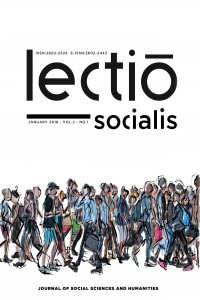Abstract
Energy
is a life-sustaining global commodity having the quality of bringing
prosperity. There is a strong mutual affinity between the availability of
energy supplies and opportunities for growth, innovation, and increasing
prosperity. In the last decade, the biggest change in energy was how and where
hydrocarbons were removed from the earth in the lead of The United States. For
instance hydraulic fracturing, or “fracking,” which allows natural gas to be
collected from shale rock formations indicate that, the next decade will be
about how energy already removed from the earth is moved across it while the
last decade was about the energy buried in the earth and how to get it out.
Recent advances show that the shale gas and solar energy promise as alternative
energy sources for future. In that article, we aim to requestion energy
strategies based on the future economic and geopolitical effects.
Keywords
References
- Bhalla, R. (2015). Russia Nervously Eyes the U.S.-Iran Deal. Geopolitical Weekly.
- BP. (2014). BP Statistical Review of World Energy.
- Cookson, J. R. (2015). Revealed: The Next Energy ’Revolution. The National Interest.
- Council on Foreign Relations. (2013). President Obama’s Energy Agenda.
- Courtney, W., Kauzlarich, R., & Yalowitz, K. (2015). Can Eurasian Energy Compete? RAND Corporation. Tarihinde adresinden erişildi https://worldview.stratfor.com/article/lower-oil-prices-carry-geopolitical-consequences
- DiChristopher, T. (2017). Trump Signs Executive Order to Roll Back Obama-era Climate Actions, Power Plant Emissions Rule. Tarihinde adresinden erişildi http://www.cnbc.com/2017/03/27/trump-to-roll-back-obama-climate-actions-%09power-plant-emissions-rule.html
- Geopolitical Diary. (2014). Oil Prices Continue to Define Geopolitics.
- Kaplan, R. D. (2012). The Geopolitics of Shale. Stratfor.
- Miller, R. M. (2015). Will Obama Strangle the American Energy Juggernaut? Tarihinde adresinden erişildi http://nationalinterest.org/feature/will-obama-strangle-the-american-energy-juggernaut-12596
- Noel, P. (2017). The Power of Siberia Natural-gas Project: Commercial or Political? IISS.
- Roggeveen, S. (2015). Forget About Cheap Oil: Cheap Solar Is the Real Game Changer. Tarihinde adresinden erişildi http://nationalinterest.org/blog/the-buzz/forget-about-cheap-oil-cheap-solar-the-real-game-changer-12068
- Stratfor. (2012). Russia Diversifies Oil Export Routes and Markets. Tarihinde adresinden erişildi https://worldview.stratfor.com/article/russia-diversifies-oil-export-routes-and-markets
- Stratfor. (2014). Lower Oil Prices Carry Geopolitical Consequences.
- Stratfor. (2016). A Bright Future for Solar Power in the Middle East. Tarihinde adresinden erişildi https://worldview.stratfor.com/article/bright-future-solar-power-middle-east
- Tol, G., & Vatanka, A. (2014). Restoring Energy Security After Crimea. Tarihinde adresinden erişildi http://nationalinterest.org/commentary/restoring-energy-security-after-crimea-10181
Abstract
Enerji, zenginlik getiren yaşamsal bir küresel emitadır. Büyüme, innovasyon ve zenginliğin artma-
sı için enerji arzları ve fırsatlarının elverişliliği arasında güçlü bir karşılıklı ilişki vardır. Son on
yılda, Birleşik Devletler’in öncülüğünde hidrokarbonun yeryüzünden çıkarılmasının nasıl ve ne-
rede olacağı, enerjideki en büyük değişimdi. Son ilerlemeler göstermektedir ki, kaya gazı ve solar
enerji gelecek için alternatif enerji kaynakları olma noktasında umut vadetmektedir. Bu makalede
enerji statejilerinin gelecekteki ekonomik ve jeopolitik etkileri yeniden sorgulanmaktadır.
Keywords
References
- Bhalla, R. (2015). Russia Nervously Eyes the U.S.-Iran Deal. Geopolitical Weekly.
- BP. (2014). BP Statistical Review of World Energy.
- Cookson, J. R. (2015). Revealed: The Next Energy ’Revolution. The National Interest.
- Council on Foreign Relations. (2013). President Obama’s Energy Agenda.
- Courtney, W., Kauzlarich, R., & Yalowitz, K. (2015). Can Eurasian Energy Compete? RAND Corporation. Tarihinde adresinden erişildi https://worldview.stratfor.com/article/lower-oil-prices-carry-geopolitical-consequences
- DiChristopher, T. (2017). Trump Signs Executive Order to Roll Back Obama-era Climate Actions, Power Plant Emissions Rule. Tarihinde adresinden erişildi http://www.cnbc.com/2017/03/27/trump-to-roll-back-obama-climate-actions-%09power-plant-emissions-rule.html
- Geopolitical Diary. (2014). Oil Prices Continue to Define Geopolitics.
- Kaplan, R. D. (2012). The Geopolitics of Shale. Stratfor.
- Miller, R. M. (2015). Will Obama Strangle the American Energy Juggernaut? Tarihinde adresinden erişildi http://nationalinterest.org/feature/will-obama-strangle-the-american-energy-juggernaut-12596
- Noel, P. (2017). The Power of Siberia Natural-gas Project: Commercial or Political? IISS.
- Roggeveen, S. (2015). Forget About Cheap Oil: Cheap Solar Is the Real Game Changer. Tarihinde adresinden erişildi http://nationalinterest.org/blog/the-buzz/forget-about-cheap-oil-cheap-solar-the-real-game-changer-12068
- Stratfor. (2012). Russia Diversifies Oil Export Routes and Markets. Tarihinde adresinden erişildi https://worldview.stratfor.com/article/russia-diversifies-oil-export-routes-and-markets
- Stratfor. (2014). Lower Oil Prices Carry Geopolitical Consequences.
- Stratfor. (2016). A Bright Future for Solar Power in the Middle East. Tarihinde adresinden erişildi https://worldview.stratfor.com/article/bright-future-solar-power-middle-east
- Tol, G., & Vatanka, A. (2014). Restoring Energy Security After Crimea. Tarihinde adresinden erişildi http://nationalinterest.org/commentary/restoring-energy-security-after-crimea-10181
Details
| Primary Language | English |
|---|---|
| Journal Section | Research Articles |
| Authors | |
| Publication Date | January 18, 2018 |
| Submission Date | December 15, 2017 |
| Acceptance Date | January 3, 2018 |
| Published in Issue | Year 2018 Volume: 2 Issue: 1 |
Lectio Socialis is a prestigious, international, and peer-reviewed journal that aims to provide a platform for scholars and researchers to share their work and ideas on policy-relevant topics related to social sciences. The journal welcomes high-quality articles from a wide range of disciplines, including economics, political science, public administration, business administration, international relations, urban planning, sociology, psychology, history, jurisprudence, and philosophy. The primary objective of Lectio Socialis is to maintain a vibrant, independent, and unbiased environment for scholars and researchers from different parts of the world to present their research, exchange ideas, and contribute to the advancement of knowledge in their respective fields.



